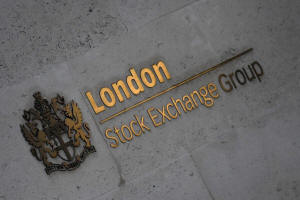Stocks on cruise control as rate cut expectations boost outlook
 Send a link to a friend
Send a link to a friend
 [November 30, 2023] By
Marc Jones [November 30, 2023] By
Marc Jones
LONDON (Reuters) - World stock markets edged higher on Thursday, heading
for their best monthly jump since the first COVID-19 vaccine
breakthroughs of 2020, as the continuing downtrend for global bond
yields lifted confidence.
Asia had made fresh gains of 0.2-0.3% overnight and Europe followed suit
[.EU] as a flurry of weak economic data out of Germany, France and Italy
bolstered bets that interest rates are heading for the chop next year.
The regional gains and similarly higher Wall Street futures helped lift
the MSCI's main world stocks index, which tracks 47 countries, a
fractional 0.01%, consolidating its near 9% leap this month.
Currency markets reacted to the European data, that included news of a
shriveling French economy, by shoving the euro lower and had bond
traders dragging forward their ECB rate cut expectations to April. [/FRX][GVD/EUR]
The data "confirm what we have been saying for a little while, Europe is
already in recession but it is a mild recession," Rabobank's Head of
Macro Strategy Elwin de Groot said.

"So we see those rate cut expectations gaining hold in the market,
although I think maybe it is a bit overdone as I don't think central
banks will be lured early into cutting rates," de Groot added, referring
to ongoing uncertainties.
With new data also showing euro zone-wide inflation had slowed again
this month, the yield on Germany's 10-year bond, the benchmark for the
bloc, fell to 2.394% in early trading, the lowest since late July.
U.S. and other major economy bond yields have also tumbled since hitting
their highest levels in more than a decade in October. U.S. Treasury
yields, which usually drive global borrowing costs, have seen their
biggest fall since 2008.
Overnight, the MSCI Asia-ex-Japan stocks index had risen 0.3% to cement
its near 7% jump this month, its best since January.
South Korea's KOSPI led the rise with a 10.6% gain, followed closely by
Taiwan and Japan's Nikkei.
"It seems market participants are clearly taking the 'no (hard) landing'
and 'Fed done' scenario to heart. Modest China domestic stimulus is
having a positive effect," said John Milroy, an investment adviser at
Ord Minnett in Sydney.
"Inflation prints and bond markets suggesting the central banks are at
least due a pause in the raising cycle. Markets like that," he added.

[to top of second column] |

The London Stock Exchange Group offices are seen in the City of
London, Britain, December 29, 2017. REUTERS/Toby Melville/File Photo

Hong Kong's Hang Seng Index reversed an early dip to finish 0.3%
higher, while China's benchmark CSI300 Index rose 0.2%, despite
disappointing Chinese manufacturing data released on Thursday.
The closely watched factory survey showed manufacturing activity
contracted for a second straight month in November and at a quicker
pace, suggesting more government support is needed to help shore up
growth in the world's second-largest economy.
For the month, the Hang Seng has lost half a percentage point while
the CSI300 is down over 2% and lower for a fourth straight month.
EASY GOING
Oil prices ticked higher again after rising more than $1 on
Wednesday ahead of expected production cuts by the OPEC+ group.
Brent was up 1.25% in London at $84.15 a barrel while safe-haven
metal gold dipped to $2,038 an ounce.
While U.S. central bank officials on Wednesday sent mixed messages,
investors still focused on comments made on Tuesday by Fed Governor
Christopher Waller, an influential and previously hawkish voice at
the bank. Waller had said rate cuts could begin in months if
inflation keeps easing.
The closely followed U.S. personal consumption expenditure inflation
report will be released on Thursday. Fed Chair Powell is also due to
speak on Friday and expected to offer crucial insights ahead of the
bank's December meeting.
U.S. financial conditions are the loosest since early September and
have eased 100 basis points in a month, according to Goldman Sachs.

U.S. rates futures markets are now pricing in more than 100 basis
points of rate cuts next year starting in May, and the two-year
Treasury yield is its lowest since July - it has slumped nearly 40
basis points this week alone.
"Absent rapid Fed easing, we expect a more challenging macro
backdrop for stocks next year with softening consumer trends at a
time when investor positioning and sentiment have mostly reversed,"
analysts at J.P.Morgan said in a note on their 2024 global outlook.
(Reporting by Marc Jones; editing by Miral Fahmy)
[© 2023 Thomson Reuters. All rights
reserved.]
This material may not be published,
broadcast, rewritten or redistributed.
Thompson Reuters is solely responsible for this content. |